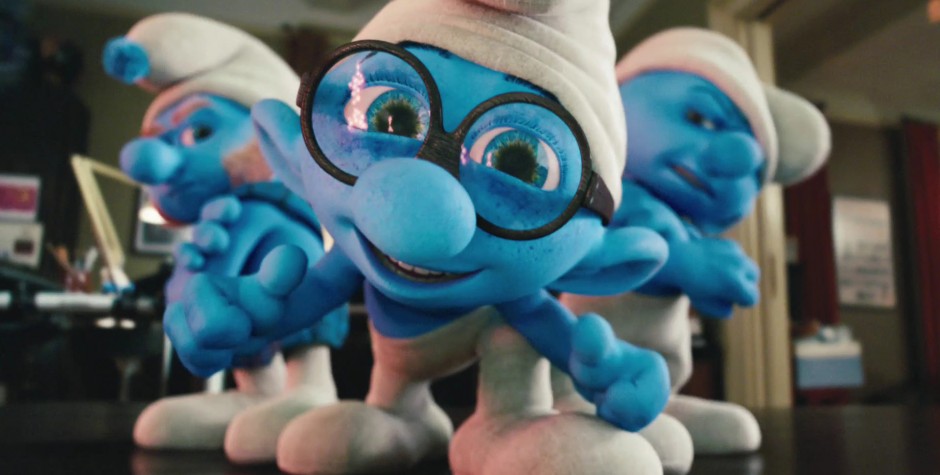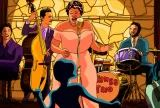07.29.2011 | By Estelle Gonzales Walgreen |
Quick Answer: What are “The Smurfs” in Spanish?
Translation: Los Pitufos (pronounced Pee-TWO-foes)
Editor’s note (Updated 2025): More than a decade after its release, “Los Pitufos” remains the go-to Spanish name for The Smurfs, but why has it stirred new curiosity wordwide about how the translation began?
Depending on what part of town you are from or what language your TV is talking to you in, you’ve heard the name ‘Los Pitufos’. Confused? Well, think of one of the most popular brands in kid’s entertainment and think of 500 million chotchkies sold worldwide with the Pitufos image that includes blue bottled water. Yes, it’s none other than The Smurfs, the beloved characters with a recurring role in children’s hearts, whose long-awaited movie opens today. Thanks to the youngsters en mi familia and their screeches about Pitufos, I realize the Smurfs I grew up with and their Pitufos were one and the same.
The Translation Challenge: From Smurfs to Pitufos
So how did we come to praise these mushroom-dwelling blue cuties with two different monikers, Pitufos and Smurfs, and where the hell did that translation come from?
After some digging, I found the culprit. Spanish magazine editor, Alfonso Moline, who some thirty years ago couldn’t translate the English word ‘smurf’ into Spanish (why he didn’t leave well enough alone, I’ll never know) named the characters after a famous folktale hero known as ‘Patufet’. Now, all of Spain, Mexico, and Latin America use the term Los Pitufos, pronounced ‘pee-two-foes’ when talking about The Smurfs. That still doesn’t explain how my family and many other U.S. Hispanics are pitufo crazy but smurf ignorant.
Marketing to Latinos: A Corporate Misstep
The answer there didn’t take much digging. It was corporate America trying to sell more Smurfs merchandise to Latinos without giving it much thought. A Spanish-speaking person must have read that old study, and the assumption was made that Hispanics only want to be sent product info in Spanish. But is that a contradiction or “adivinanza”? Therefore, most Smurf advertising in Spanish-language media and in ads where there are high concentrations of Latinos only use the Pitufo name. Bad idea, I say.
First, it’s generally appreciated if a translation for marketing purposes is at least in the same English-sounding neighborhood, you know, like Nueva York or Los Doyers (which incidentally the team trademarked). Don’t sell me Alvin y Las Ardillas when everyone else is talking about Alvin & the Chipmunks. And don’t promote Harry Potter y Los Reliquias de la Muerte which doesn’t sound as British and regal as Harry Potter and The Deathly Hollows. When I was growing up, no one acknowledged the Latino consumer base or thought it necessary to create separate and not necessarily equal marketing campaigns – so I shouldn’t complain too much about the progress made. However, iconic cultural icons like the Smurfs, Mickey Mouse, and Corona are better represented in the language they were created with.
Cultural Representation in Media and Merchandising
The movie seems to have enough Hispanic traits that some marketers might be worried. The movie has George Lopez’s East LA. barrio accent and Sofia Vergara’s Colombian nasal lilt – all part of the Smurf’s village. And please familia, don’t confuse me by referring to George’s character as the Pitufo Gruñon when it’s really Grouchy Smurf.
The Smurfs, or ‘Los Pitufos’, have become a part of Latin American popular culture, symbolizing a unique blend of nostalgia and contemporary appeal. Their merchandising success is a testament to their popularity. From Smurf houses to the figurines of Papa Smurf and Brainy Smurf, the range of products available is vast. Each item reflects the charm and simplicity of the Smurfs, making them some of the biggest collectible toys around the world. This success is mirrored in the anticipation for their movies, which are often long-awaited events for fans of all ages.
The Linguistic and Cultural Bridge
In a way, the story of the Smurfs and their Spanish translations speaks volumes about the evolution of marketing strategies toward U.S. Hispanics and Latin Americans. It showcases the need for a nuanced approach, one that respects the linguistic and cultural diversity of these communities. Terms like ‘La Aldea Pitufa’ or ‘Echo Flood and Smurf Attacks’ may not be part of the everyday lexicon, but they symbolize the broader impact of these characters in different parts of the world.
Their presence in video games and other media further cements their status as enduring icons. For many U.S. Hispanics, the Smurfs are more than just characters; they are a part of their identity, a connection to both their American and Latin roots. This dual identity is reflected in the way they consume media, often seamlessly switching between English and Spanish, between the Smurfs and Los Pitufos.
The Universal Appeal of ‘Los Pitufos’
Overall, the story of ‘Los Pitufos’ is more than just a tale of translation and marketing. It’s a narrative about cultural adaptation, about how a simple English word transformed into a Spanish phenomenon. It’s about the power of media to bridge gaps and bring together different communities under the shared love for blue, mushroom-dwelling characters. So, as we celebrate the release of the new Smurfs movie, let’s remember the journey of these characters from their humble beginnings to their status as global icons. Enjoy the movie, and if anyone asks what you think of ‘Los Pitufos’, simply retort “Do you mean Los Smurfs?” or “I don’t hablo Spanish, just Spanglish.”
Appendix: Smurf Character Names in Spanish
For quick reference, here are the most common translations mentioned in the article:
| Papa Smurf | Papá Pitufo |
| Smurfette | Pitufina |
| Brainy Smurf | Pitufo Filósofo |
| Grouchy Smurf | Pitufo Gruñón |
| Clumsy Smurf | Pitufo Tontín |
| Gargamel | Gargamel |
Related:
Comments
-
July 14, 2013
Rob….. super lame and undocumented article….
“Spanish magazine editor, Alfons Moline, who some thirty years ago couldn’t
translate the word smurf into Spanish ” not the word smurf but the word Schtroumph in French.
And no the smurf are definitely NOT part of American pop culture but a famous and historic Belgian comic! -
December 16, 2013
TedI first heard the word Pitufo back in 1984, a fried of mine called everyone a Pitufo. When I asked him what it meant he told me smurf. I didn’t believe him, but he stayed adamant.
-
June 2, 2014
Pepe99Smurfs is not word easy to pronounce correctly for Spanish speakers. as no Spanish word starts with an s followed by another consonant, ends in f, or form its plural by adding an S. Therefore, if untranslated, it would have become in something like “los esmurfos”, which sounds infinitely worse than “los pitufos.” Besides, the smurfs “evolved” in French-speaking Belgium, so it should be the Belgians who should be complaining.
-
March 10, 2016
Yuki KonAnExactly!, For my spanish ears “pitufos” sound great and normal to me but “smurf” sound forgain and i dont think a spanish speaker that dont even know english could pronounce “smurf” correctly.
-
-
July 19, 2015
TimesamythThis subject has kept me awake for many a night. I am not a native Spanish speaker. However, I never could understand why some movie titles were translated so literally into Spanish (while others were not) especially when the English word made much more sense. For example, the movie “UP” is just left in the English word…which is how it should be. Yet “Grease” the movie is translated to both ‘Vaselina’ and ‘Brillantina’…… in some cases it even ruins the movie…. Thelma and Louis is translated to ‘Un Final Inesperado’…….doesn’t that basically give away the ending?! why is it translated like that?!
This subject has haunted me for years….but marketing makes a lot of sense…in some cases.
-
March 10, 2016
Yuki KonAnSpanish speakers would have pronounced “Gris”or “Greh-ah-seh” instead of “Grease” and wouldnt even know what does that mean thats why they translated it. 🙂
-
-
May 19, 2017
Edwin CostaWhat a horrible article, lol. How can someone be so bitter about a renamed franchise? I cringed so hard at that last sentence, “and if anyone asks what did you think of ‘Los Pitufos’ simply retort “Do you mean Los Smurfs?” or “I don’t hablo Spanish just Spanglish.”




























